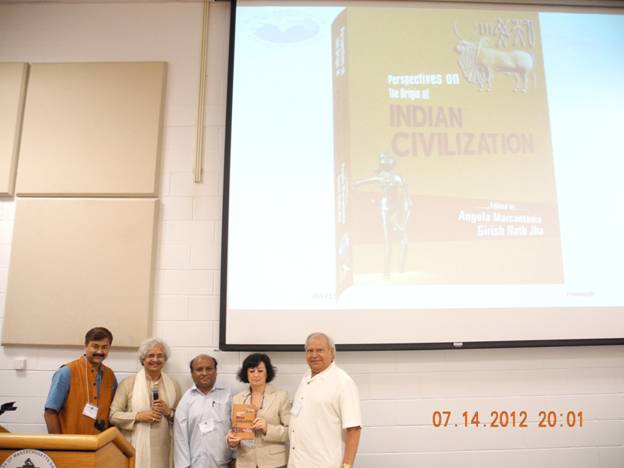Contribute
| World Association Of Vedic Studies (WAVES) Holds Its 10th International Conference |
Press Release
07/31/2012
(This article is sponsored by Masala Art)
The World Association for Vedic Studies (WAVES) held a successful Tenth International Conference at the University of Massachusetts in Dartmouth, MA from July 13-15. This conference was co-sponsored by the Center for Indic Studies at the University of Massachusetts, Dartmouth. After holding its first International conference in Atlanta, GA in 1996, WAVES has attracted scholars from all over the world to its ten conferences which are known to feature open discussions and scholarly presentations on topics generally related to the Vedas and Indology. Scholars present talks on related topics from historical, linguistic, anthropological, gender, archeological, astronomical, philosophical, and other perspectives. Scholars traveled from many parts of the world to participate and present at the conference, including from India, Spain, Canada, Russia, and Australia. Dr. David Miller, Professor of religious history at University of Toronto was very “pleased to be part of such a gathering of religious and Vedic scholars†and pledged his support if his University was chosen as the next conference venue. Waves 2012 delegates were welcomed to UMass Dartmouth campus by Assistant Chancellor Michael Eatough, who brought a message of welcome from the Chancellor’s office. Provost John Farrington also dropped by to meet and greet the delegates. The conference started with an invocation and Vedic chanting, and a blowing of the conch which traditionally marks the auspicious beginning of an event in Vedic culture. “I have attended many past WAVES conferences, but this was by far the most attended, with a large number of scholars gathering at one place†said Dr. Madan Lal Goel, Professor Emeritus of Political Science at the University of Florida. About 250 people attended this 3 day conference. There were over 160 scholarly presentations, in addition to Panel discussions, Keynote speeche, and the performance of a Havan according to strict Vedic guidelines. Sanjay Saxena of the Gayatri Pariwar gave a wonderful demonstration of Vedic havans that have been performed for thousands of years, while explaining the significance of the various mantras involved. The main theme of the conference as envisioned by the general Chairman of the conference, Dr. Shiva Bajpai, Professor Emeritus at California State University was “Vedic Cultures – Epic and Pauranic Phaseâ€. Many scholars had their paper centered around this main theme. “This is the largest number of overseas presenters I have ever seen at any WAVES conference†observed Dhirendra Shah, a WAVES founding member and its current Treasurer. He added that with the help of current technology, some presenters were able to present their papers remotely via satellite, and were able to watch the proceedings of the conference via live streaming on their computers. This conference was the second WAVES conference where a special track was designed for Youth presentations. Ravi Jaishankar and Sarika Persaud from the Hindu Students Council (HSC) remarked that “It was nice to see the younger generation presenting their views and findings on wide ranging topics within the Vedic Studies fold.†As part of the youth track, over a dozen young students from the American Vivekananda Academy, run by WAVES BOD member Pandit Ramadheen Ramsamooj, participated in the conference and made heartfelt and thought-provoking presentations ranging in topic from the plight of Hindu Bhutanese refugees in Nepal to the challenges of practicing Dharma faced by youth in America. Dr. Abhaya Asthana and Shri Sant Gupta from HMEC (Hindu Mandir Executives’ Conference), the premier forum networking Hindu Temples and other Vedic/Dharmic institutions in North America said the conference helped in exploring areas for co-operation between HMEC and WAVES for benefit of the community. Dr. Keith Wallace from the Maharishi Institute of Management, speaking on behalf of Dr. Tony Nader, said “Epics like Ramayana provide an insight into the human physiology, which can be used to understand and learn about oneselfâ€. Dr. R.P Singh of Jawaharlal Nehru University of Delhi said that the conference deliberations were “rich and intense all along, raising philosophical, scientific, literary and even mystical themes. The conference tried to resolve certain contending claims and it also opened up certain issues requiring fresh debate and discussionâ€. Dr. Angela Mercantonio from University of Rome, La Sapienza, attending her first WAVES conference observed that the conference was “a good venue for international scholars from multiple disciplines to discuss varied topics keeping in mind the scientific perspective.†Dr. David Scharf, a Physicist, who spoke on application of physics into understanding the various states of consciousness, said “The work of the WAVES organization is extremely important, not only for the academic advancement of ideas, but for the progress of society at large in a life supporting directionâ€. Thomas Dyball, a doctoral student, mentioned that he “heard some brilliant presentations, which greatly expanded my appreciation of Vedic cultureâ€. Dr. Neela Bhattacharya Saxena of Nassau Community College observed that she “enjoyed meeting some very knowledgeable presenters who enhanced my knowledge.†Dr. Bina Gupta from the University of Missouri Columbia mentioned in her speech that most conferences have a large slant towards Eurocentric concepts, and that this conference was one of the few that presented ideas from an alternative perspective. She mentioned that most PhD granting departments do not introduce Indian Philosophy. The philosophy taught by most institutions is generally analytical, theoretical and logical, whereas Indian Philosophy additionally deals with the practical. Dr. Vinod Deshmukh who presented a paper on ‘The Astonishing Brain and Holistic Consciousness: Neuroscience and Vedanta Perspectives’ said that this conference provides a “good forum for the expression of scientific and humanistic understanding of the Vedasâ€. Dr. Rama Rao Pappu, a veteran of WAVES and Vedanta conferences, found the conference “well represented and organizedâ€. He was especially pleased with the international group of scholars. WAVES will publish select conference proceedings and deliberations on its website, at http://www.wavesinternational. Aditi Banerjee and Ravi Joshi, members of the Board of Directors of WAVES Contact: Aditi Banerjee [banerjeea@gmail.com], Ravi Joshi (ravi@medhajournal.com)
You may also access this article through our web-site http://www.lokvani.com/

